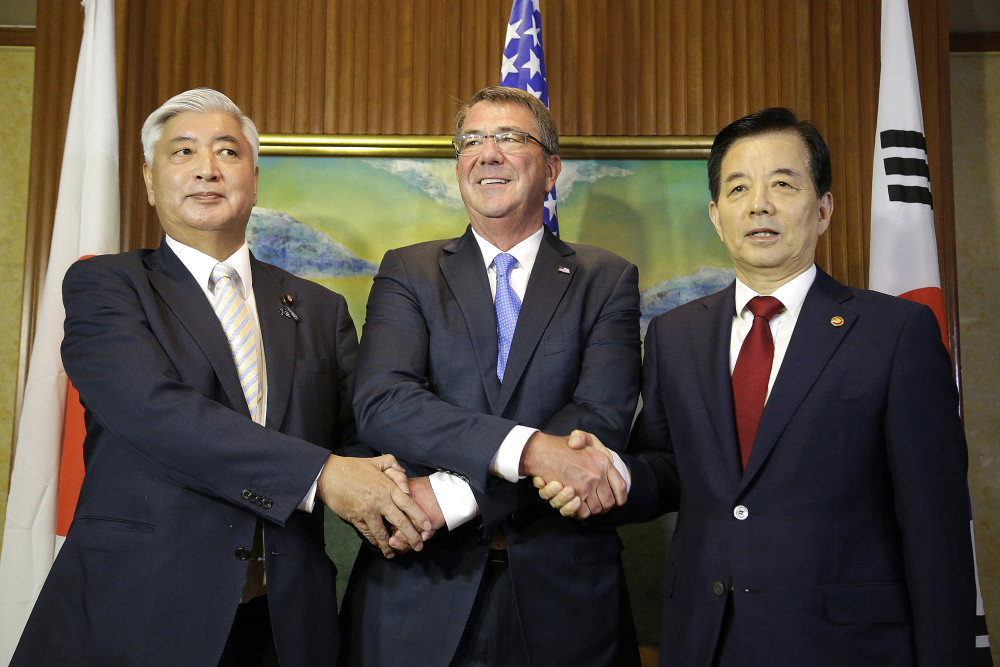US proposes Asia security network; China welcome to join

U.S. Defense Secretary Ash Carter, center, meets with Japan’s Defense Minister Gen Nakatani, left, and South Korea’s Defense Minister Han Min-koo, right, during their trilateral meeting on the sidelines of the 15th International Institute for Strategic Studies Shangri-la Dialogue, or IISS, Asia Security Summit on Saturday, June 4, 2016, in Singapore. (AP Photo/Wong Maye-E)
SINGAPORE—US Defense Secretary Ash Carter is proposing to accelerate and deepen defense cooperation in the Asia-Pacific region by expanding a “security network” of countries whose militaries would train together and eventually operate together.
Speaking to an international security conference in Singapore on Saturday, Carter said China would be welcomed in this network.
But he also cited frequent American complaints about China unnerving its neighbors with expansive moves to build up reefs, islets and other land features in the disputed South China Sea.
Carter said this security network would represent “the next wave” in Asia-Pacific security.
Inclusive
Article continues after this advertisement“It is inclusive, since any nation and any military—no matter its capability, budget, or experience—can contribute. Everyone gets a voice, no one is excluded, and hopefully, no one excludes themselves,” he said, alluding to China.
Article continues after this advertisementHe emphasized possibilities for cooperating with China while stating that the United States will remain the preeminent power.
“America wants to expand military-to-military agreements with China to focus not only on risk reduction, but also on practical cooperation. Our two militaries can also work together,” he said, bilaterally or as part of a broader security network to combat global threats like terrorism and piracy.
Tom Mahnken, president of the Center for Strategic and Budgetary Assessments, a Washington think tank, praised Carter’s emphasis on developing partnerships.
“Secretary Carter was right to emphasize multilateral approaches in the Asia-Pacific region. Indeed, America’s alliances and partnerships in the region give us an enduring competitive advantage,” Mahnken said by e-mail from Washington. “By contrast, China’s actions have increasingly isolated it.”
Few issues lately
At a news conference later, Adm. Harry Harris, head of the US Pacific Command, said that while his forces are ready to confront China if necessary, there have been few significant issues with China lately in the South China Sea.
“We’ve seen positive behavior in the last several months by China,” Harris said, adding, “I’m encouraged by the activities” between the US and Chinese militaries.
He noted that China plans to attend the Rim of the Pacific exercise this year, with US and Chinese warships operating together from Guam to Hawaii.
Adm. John Richardson, the US Navy’s top admiral, said “more and more” interactions at sea with the Chinese navy are safe and professional.
In proposing a “principled security network” across Asia, Carter said it would include “nations building connections for a common cause, planning and training together, and eventually operating in a coordinated way.”
He said in September he will cohost, with his Laotian counterpart, a meeting of defense ministers from across the Asia-Pacific region, to find new ways to broaden and deepen a regional security network.
In raising the prospect of conflict in the South China Sea, Carter said China is isolating itself by building up man-made islands there.
In some cases, he said, the Chinese are erecting airfields that will extend Beijing’s military reach.
He said for the second time in a week that China’s actions could erect a “Great Wall of self-isolation.”
“There is growing anxiety in this region, and in this room, about China’s activities on the seas, in cyberspace, and in the region’s airspace,” he said. “Indeed, in the South China Sea, China has taken some expansive and unprecedented actions, that have generated concerns about China’s strategic intentions.”
PH challenge
He also noted a coming ruling by a UN arbitration tribunal on the Philippines’ challenge to China’s claims in the South China Sea. He called this ruling, which is expected this summer, “an opportunity for China and the rest of the region to recommit to a principled future, to renewed diplomacy, and to lowering tensions, rather than raising them.”
During a question-and-answer session with his audience, Carter was asked why the US attaches such importance to exercising its right to fly and sail military aircraft and ships near other countries’ coasts, including China’s.
“What we stand for is the principle of rule of law and abiding by international law in the commons,” Carter said. “It’s not a focus on China. It’s a focus on principle.”
In his speech, Carter mostly emphasized the positive.
“The United States welcomes the emergence of a peaceful, stable and prosperous China that plays a responsible role in the region’s principled security network,” he said. “We know China’s inclusion makes for a stronger network and a more stable, secure and prosperous region.”
He also made clear, however, that the United States intends to maintain, even expand, its military presence in the Asia-Pacific region.
“The defense department maintains its world-leading capabilities because the United States has made incomparable investments in it over decades. As a result, it will take decades or more for anyone to build the kind of military capability the United States possesses,” he said. AP